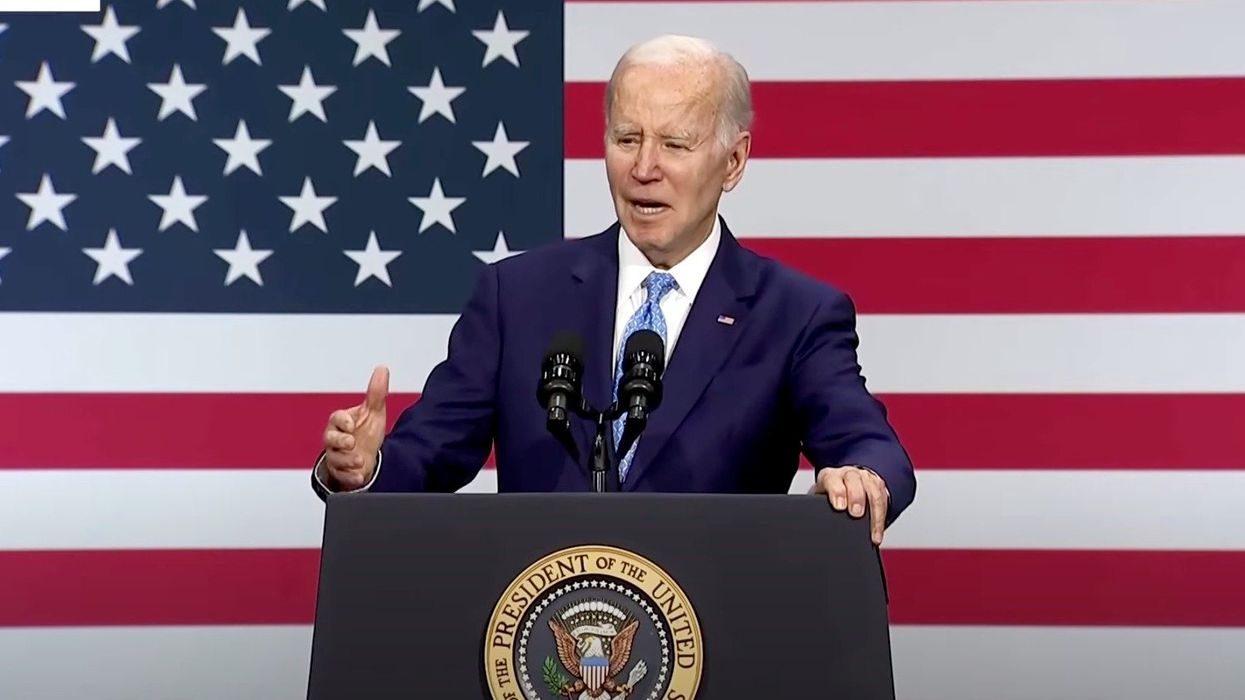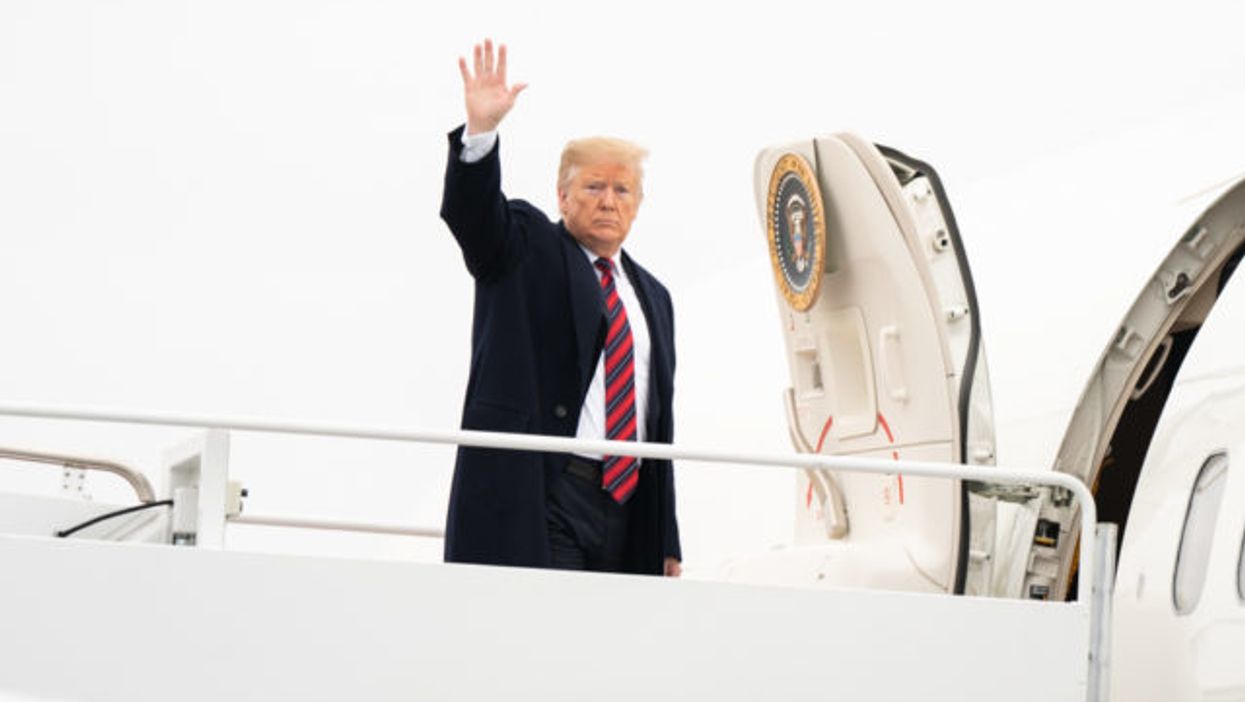Fox's Right-Wing Crime 'Crisis' Bombs -- Because Violent Crime Is Down
After President Joe Biden accurately declared that murders and other violent crimes fell last year, Fox News responded by urging viewers to focus instead on individual tragic anecdotes of violent crimes, particularly ones involving migrants. The network is concocting an unverifiable surge of “migrant crime,” which its personalities can use to reinstall Donald Trump in the White House.
“Last year, the United States had one of the lowest rates of all violent crime — of all violent crimes in more than 50 years,” Biden said Wednesday in remarks to police chiefs from major cities. “Murder, rape, aggravated assault, robbery all dropped sharply, along with burglary, property crime, and theft. And it matters.” Biden attributed the decrease to the work of “the law enforcement and community leaders here today” and touted the impact of the 2021 American Rescue Plan’s funding for public safety. He concluded by saying,“Our plan is working, but we still have much more to do.”
Biden’s statements are consistent with the data evaluated by Jeff Asher, a crime analyst whose work has appeared in outlets like The New York Times,The Atlantic, and Axios. Asher wrote in December:
Murder plummeted in the United States in 2023, likely at one of the fastest rates of decline ever recorded. What’s more, every type of Uniform Crime Report Part I crime with the exception of auto theft is likely down a considerable amount this year relative to last year according to newly reported data through September from the FBI.
Americans tend to think that crime is rising, but the evidence we have right now points to sizable declines this year (even if there are always outliers). The quarterly data in particular suggests 2023 featured one of the lowest rates of violent crime in the United States in more than 50 years.
Biden’s use of data to show that the violent crime spike, which originated during the Trump administration, has receded under his tenure is an antidote to Fox’s typical practice of leveraging individual crime anecdotes to damage Democratic politicians. Fox personalities have spent the last several months diligently trying to create a narrative of a wave of “migrant crime” purportedly triggered by Biden’s border policies, flooding the airwaves with reporting on such anecdata. They are working hand-in-glove with Trump, who used a recent interview on the network to take credit for originating the “new category” of “migrant crime.”
“There is no evidence that immigrants in the country illegally have historically committed more violent crimes, and there is no evidence that such immigrants are committing more violent crimes,” the Washington Post’s Philip Bump noted in an analysis of the Fox’s coverage — and Republicans are responsible for spiking bipartisan border security legislation for the explicit reason that Trump wants to use border chaos to win the election — but that’s not slowing them down. (Update: NBC News reported that its “review of available 2024 crime data… shows overall crime levels dropping in those cities that have received the most migrants,“ including Philadelphia, Chicago, Denver, New York, and Los Angeles.)
Fox’s response to Biden citing actual crime data seemed to range from offended to infuriated, with everyone from “straight news” correspondents to prime-time propagandists pushing back by pointing to anecdotes. Their Wednesday commentary presents a case study of how Fox’s day-in, day-out coverage uses individual instances of crime to terrify their viewers and encourage them to vote for Republicans.
Fox reporter Jacqui Heinrich previewed Biden’s speech — and telegraphed her network’s partisan counterattack — on Wednesday afternoon.
“Unclear how compelling a case he can make that his record on crime is better than Trump’s, I suppose he’s going to look at the numbers and try to say that that’s the evidence people need to look at,” she said on America Reports. “But anecdotally, when you have families and communities experiencing high levels of crime, and especially experiencing high levels of migrant crime, when you’ve got record numbers at the border — and this has been the Achilles heel of the administration — unclear if that’s going to be a winning argument.”
Anchor Sandra Smith lashed out at Biden after the speech concluded, falsely claiming that Biden had not included a time frame for his statement that violent crimes dropped and saying that the president was sending a “brutal message” to people from unnamed cities experiencing rising crime.
“You know, I'm just looking at the list of participants in that room and the cities from which they come: Philadelphia, Buffalo, Miami, Milwaukee, Chicago. I mean, Congresswoman, I don't know who he thought his audience was by standing up and touting -- he said, ‘Murders, rapes, aggravated assaults, robberies all dropped sharply,’ without context or time frame,” Smith said. (In reality, police departments in Philadelphia, Buffalo, Miami, Milwaukee, and Chicago all reported decreases in homicides or violent crime in 2023.)
“That's a brutal message to people when they're saying pretty loudly that they don't like the crime that is on the rise in their cities,” she added.
Fox’s flagship “news side” program, Special Report, did not mention Biden’s remarks about crime data — but it did make time for more anecdotes. “For the third and fourth time this week, we are telling you about an illegal immigrant arrested in connection with a brutal crime," Bret Baier said at the top of a segment.
Later in the program, Trumpist radio host Hugh Hewitt implicitly explained the political strategy Fox is pursuing. “Every single act of violence perpetrated by an illegal immigrant between now and [the election], expect it to be a headline, it is Joe Biden's Achilles heel,” he said. Baier responded by highlighting “the recent headlines that we have seen just in the past few days about these heinous crimes allegedly at the hands of illegal immigrants.”
Fox’s evening show propagandists piled on, touting individual instances of “migrant crime,” laying them at Biden’s feet, and warning viewers that they could be the next victims.
Laura Ingraham scoffed at Biden’s use of data in his speech, saying that “crime is on everyone's mind,” that “we all know communities don't feel safer,” and that “there's no meaningful change in the policies that are making America more dangerous.”
“Anyone who thinks that this is an isolated incident, no. Women and children are being brutalized by illegal aliens all over the United States,” she later added before highlighting individual cases, as on-screen text read, “the deadly cost of Biden’s open border.”
Jesse Watters went even further. “There is a migrant crime spree killing Americans and the president is an accessory to murder,” he alleged, highlighting anecdotes and attacking Biden’s speech. “A vote for Biden is a vote for more death,” he concluded.
Fox is repeating the strategy they tried in the months leading up to the 2022 midterm elections. Republicans, at the urging of Fox’s then-star host Tucker Carlson, tried to win back Congress by focusing on crime, and Fox poured on the coverage in an attempt to carry them to victory.
But when data on the period was finally reported, it turned out that violent crime had actually fallen in 2022. Fox had manufactured a Biden “crime crisis” based on anecdotes because they wanted to help Republicans win elections. And two years later, they’re doing it all again.
Reprinted with permission from Media Matters.




